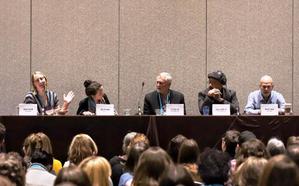 At the standing-room-only Thursday Wi15 panel "Writing in Times of Crisis," Brooklyn's Books Are Magic owner Emma Straub (and author of the novel All Adults Here, Riverhead, May 5) engaged Julia Alvarez, Erik Larson, James McBride and local author David Simon in a passionate conversation about why "crisis is the font of all storytelling," as Larson put it.
At the standing-room-only Thursday Wi15 panel "Writing in Times of Crisis," Brooklyn's Books Are Magic owner Emma Straub (and author of the novel All Adults Here, Riverhead, May 5) engaged Julia Alvarez, Erik Larson, James McBride and local author David Simon in a passionate conversation about why "crisis is the font of all storytelling," as Larson put it.
Larson began his book The Splendid and the Vile: A Saga of Churchill, Family, and Defiance During the Blitz (Crown, February 25) before the election, but quickly saw the parallels between Churchill's time and the present. He described Churchill's life in terms of the "Vonnegut Curve," Kurt Vonnegut's way of plotting story, with one axis going from bliss to misfortune, and the other axis tracing chronology. "The day Churchill becomes prime minister he goes from bliss [at becoming prime minister] to serious misfortune [Hitler invades Holland and Belgium]."
 |
|
| Emma Straub, Julia Alvarez, Erik Larson, James McBride and David Simon | |
James McBride, whose novel Deacon King Kong (Riverhead, March 3) describes the 1969 shooting of a drug dealer by a South Brooklyn church deacon, said, "Writing about the past helps me delineate between good and evil. The lines of demarcation were clean. Now everyone's become black. The sidewalk behind you disappears; our history means nothing." Like McBride, David Simon (Homicide; The Wire) was also trained as a journalist, and he added, "You write with more caution or fear when you write in the present: it's an incomplete history." Simon, who's currently adapting Philip Roth's The Plot Against America, which depicts an alternate America where Charles Lindbergh defeats FDR in the 1940 election, for an HBO miniseries, said that the subject "speaks to something now. Looking back is a great device for grieving this moment."
When Straub asked the panelists to describe what crises they return to, Julia Alverez (Afterlife, Algonquin, April 7) said, "I think readers are better at seeing those. I always look for reasons not to write." After laughter from the audience subsided, she said she writes in response to "the pebble in my shoe. I was a 10-year-old immigrant learning English. One theme is how to understand the confusing moment. The other is engaging with the language. Emily Dickinson said, 'There's no approximate language in a poem.' "
In response to Straub's question about how the authors know which format is best for a particular story, Simon responded that filmmaking is unusual, in that "it's a collaboration--and it costs a lot. Stuff gets made when it gets made. If your heart's there, you have to work on it." He pointed out that they'd mapped out a three-season arc for The Deuce, and Season 1 came out before the Weinstein scandal broke. "If the two were reversed, [The Deuce] wouldn't have gotten made." McBride said that "If you open a history book, there's a novel on every page. I like to show people coming together, not coming apart."
To Larson, Straub said that his research reads like a novel: "How do you know the shape of it?" Larson said that for the Churchill book, "A little part of me hated myself every day. To wade through stereotypes and caricatures, it was like Downton on Downing." He said the narrative isn't clear, but "I always know endings." "Is that because you're writing history?" asked Alverez, to laughter from the room.
An audience member asked the authors, "In times of crisis, when people are suffering, do you feel a responsibility to help them heal? Or just to present it properly?" Alvarez was the first to reply, "We have the tradition of the testimonial: bearing witness is the healing. It's a wonderful healing process, to be accompanied." McBride said, "I try to bring hope to my work." Simon responded that, as a journalist, "I have imposter's syndrome--I don't want to be embarrassed by the real. I want the testimonial to be accurate. I'm not an agent for good, but I don't want to be an agent for bad."
Another question from the audience was for James McBride, asking how to get African American boys to read more. "I work with kids every weekend in Brooklyn," McBride replied. "If [reading] doesn't happen at home, it won't happen. Money isn't our problem; ignorance is our problem. We need to respect education." --Jennifer M. Brown

